It’s been a long time since I played a game quite so obviously and unashamedly console as God of War. It’s like a laundry list of all of the hottest console trends and design patterns both past and present: third-person, over-the-shoulder camera, open world, brawler combat, squeezing through narrow passageways that conceal loading screens, quicktime events that try and preserve the illusion that this is supposed to be an interactive medium while you’re watching a lengthy cutscene, the comedy ledges that somebody (who?) has gone around marking with white paint to indicate that they’re climbable — I could go on for quite some time here before I got to the end of it. I’d like to say that God of War surprised me in some way by defying its own nature and providing some unexpectedly outside-the-box gameplay features to liven up mechanics that have already been done to death by all of the other trend-chasers, but it really doesn’t. It’s as safe and conventional as they come, doing almost nothing that I haven’t already seen a hundred times in other games.
Almost nothing.
Despite the on-paper description of God of War containing little that would impress me, the experience of actually playing it is a very different thing indeed. It’s one of those very rare games where I cannot help but admire the craft that has gone into it; its individual mechanical components might be very bland, very conventional, very console, but the way they’ve been executed elevates them far above even comparable games. Horizon Zero Dawn, for example, a very good game which came out a year before the original release of God of War and which was also intended to be a marquee title that would sell Playstations, but in terms of presentation God of War leaves it choking in the dust to the point where it actually makes me feel a little bit uncomfortable. God of War is what you get when you have basically infinite time and money to make something and you don’t waste that time forcing your employees to crunch on horse testicles1. Nearly every element of it is absurdly polished to a degree that most other games simply cannot achieve because they don’t have the resources. God of War does, and I’m worried it might actually spoil me for other comparable games; while I would very much like it if the AAA games industry could release fewer bug-ridden messes than it currently does, I don’t think it’s realistic to expect all games to be as polished as God of War is. It’s simply beyond them.
God of War is actually the fifth2 game in the God of War series. As the lack of numbering or subtitle implies, it’s a little bit of a soft reboot that tries to draw a line between God of War 2018, which is competently if predictably written and something that doesn’t look tremendously out of place alongside your Horizon Zero Dawns and your Last of Uses, and the original God of War trilogy, which are some of the edgiest games ever to come out of the noughties3. After slaughtering his way through the entire Greek pantheon of gods, series protagonist Kratos retired to a nice little cabin in the woods, married a woman called Faye, had a son called Atreus, and appears to have spent much of the next ten years being a deadbeat dad because as of the start of God of War Atreus barely knows who he is. This makes things slightly awkward because the game kicks off with Faye’s funeral (the tutorial segment is all about finding wood to build her funeral pyre) and Kratos and Atreus set off to fulfil Faye’s final wish: that her ashes be scattered from the highest peak in all the realms.
So yes, God of War is unfortunately a road trip with rather more forced father-son bonding scenes than I was really in the mood for. Just as the first God of War encapsulated the edgy teen phase of the people who made it, that the 2018 version appears to have grown up a bit is a simple reflection of those same developers also having grown up and had kids of their own. It is, in its own way, just as hackney and cliched as the original; this is still a Man Game about doing Man Things (there is exactly one female character in the entire game), it’s just that by 2018 the definition of Man Things had expanded a bit to include “fatherhood” alongside “graphic violence”. That God of War successfully sells this to me in spite of my deep scepticism is largely down to two things: some smart handling of Atreus as a gameplay mechanic, which I’ll talk about later, and the performances of Christopher Judge as Kratos and Sunny Suljic as Atreus. Suljic manages to make Atreus likeable and inquisitive rather than whiny and annoying (unless the plot calls for it), which is impressive for a child character, while Judge has been hired to do an even deeper version of his Teal’c voice and so doesn’t have a huge amount of latitude in his performance — especially because this later-stage Kratos isn’t the most talkative of protagonists – but nevertheless manages to pack a surprising amount of range and emotion into each line.
In fact God of War’s voice acting is a perfect example of how the game’s astonishing production values elevate something that’s otherwise unremarkable. The core of the story and the game’s central quest line (called, fittingly, The Journey) is really nothing special and hews very closely to existing video game convention in that the story is there mostly to connect together the game’s set pieces rather than existing on its own merit. Nevertheless, God of War succeeds in camouflaging this with a truly ridiculous amount of voiced dialogue that ensures you’re never thinking about it too hard. Atreus is constantly commenting on the things you come across, Kratos is firing back appropriately taciturn responses, and there’s a third member of the group called Mimir who is picked up halfway through the game and injects some much-needed humour into proceedings. It took me 25 hours to finish God of War to my satisfaction, and I don’t think the game went more than thirty seconds of this time without somebody saying something. This on its own is not particularly unusual by the standards of AAA titles, but the thing that really stood out about God of War is how little repetition there was. There’s a few generic voice lines related to game mechanics, such as Atreus calling out a point of interest or hinting at how to get past some obstacle, but nearly everything else is a unique, one-off piece of dialogue.
This even extends to what would in other games be generic linking dialogue. A large portion of God of War is spent paddling around on a boat, and while you’re doing this Atreus will ask Kratos (or Mimir) to tell him stories to pass the time. If you sail up to the shore and leap out of the boat Kratos will pause midway through this storytelling, and later on Atreus will ask him to resume where he left off. But instead of a single “Can you carry on that story you were telling earlier?” line that can be used across the entire game, and having Kratos restart the whole thing from the beginning like a robot with a tape recorder, God of War has Atreus say lines with specific references to each story Kratos got cut off in the middle of telling, like “So what happened with the horse and the stag?” Sometimes he has different lines depending on where exactly in the story Kratos left off earlier, and Kratos will pick it back up more-or-less from the point that he stopped. The amount of effort required to record all of this extra dialogue and hook it up in the game so that it’ll play the right lines at the right times is non-trivial, and God of War could certainly get away with not doing it because I’ve never seen another game go to these lengths to try and make its ambient conversations seem organic. But it does it anyway, just because it can, and it’s thanks to these extra flourishes that Kratos and Atreus feel like comparatively well-rounded and natural characters — enough so that I forgave the overly game-y nature of God of War’s main story.
Gameplay-wise, God of War is all about running around a moderately-sized open world looting chests and killing baddies so that you can get money and resources to upgrade your equipment. Yes, there’s also that main plotline with its spectacular set-pieces, like Kratos having a punch-up with another god on the back of a dragon, but under the hood these are the most dated parts of the game: wholly linear dungeon romps straight out of 2007, where the puzzles and enemies are there to give you something to do to break up the monotony of running through yet another cave rather than because the designers intend them to be challenging in any way. The open world was significantly more interesting to me thanks to the way God of War structured it; the hub area starts out as a big lake with only a few islands and ruins protruding above the surface, but as you progress the main storyline the lake will start to drain, lowering the water level and exposing more islands for you to explore and more river routes leading off to side areas. Some of these side areas are pretty significant half-hour romps through a series of tougher combat encounters, and unlike the main story it’s possible to run into enemies in the open world who significantly outlevel you and one- or two-hit Kratos. God of War has excellent checkpointing so you never lose more than a minute of progress when this happens, hitting the right balance of giving this open world some teeth without pissing the player off too much.
It’s also where the harder puzzles reside, and while “harder” is a relative term (these took me up to ten seconds to figure out, instead of the puzzles on the critical path where the solution is instantly obvious) it’s important to have something in this game that isn’t hitting monsters, some opportunity for the brain to decompress and enjoy the world for a bit. The visual design of said world is not that impressive, when all is said and done, since God of War reserves its most impressive visual beats for the critical path; the main body of the lake is certainly striking since there’s a bloody great world serpent peering at you over a mountain the whole time you’re paddling around from island to island, but the side areas that fork off from it are a tad uninspired, being mostly the same series of generic caves, ruins and mineshafts that you can find in any other game. Again, God of War does camouflage this pretty well with its dialogue, as having Atreus and Kratos carry on a lengthy conversation about the history of the ruins they’re currently climbing though (which are otherwise visually identical to at least five other areas in the game) does a lot to sell me on this area being more than just another open world question mark location to clear of all loot and collectables.
Beyond that, though, I’m willing to forgive the open world being a little bit on the drab side for three reasons. First is that it’s only really underwhelming by the standards of the rest of God of War; stack it up against any other open world environment, particularly anything made by Ubisoft, and it suddenly becomes apparent just how well-constructed it is. This is because of the second point in its favour, which is that my description of it as “moderately-sized” is actually a big compliment. Playing Assassin’s Creed: Valhalla back at the end of 2020 really soured me on the idea of big open worlds that force development studios to spread themselves and their content far too thinly; I’d much rather have one substantial quest that takes me twenty minutes to complete and which takes me to several different locations than ten tiny ones where the quest objective is sitting right next to the person who gives you the quest in the first place. God of War’s open world may be on the small side by modern standards, but it’s got enough body to it to make exploration satisfying and it does not outstay its welcome. And then finally there’s something I didn’t realise until I was close to the end of the game: the vast, vast bulk of the open world — everything in and around the lake — is completely optional. God of War’s critical path leads you away from it and has you spending most of your time climbing mountains or hopping dimensions via the Bifrost bridge; exploring the various islands of the lake as they are gradually uncovered is not part of it at all, and I’m actually a little bit staggered that engaging with what seems like it should be such a core feature of the game isn’t remotely required to finish it.
Truly optional content tends to be anathema to modern game development, you see. Even RPGs struggle with the concept these days, because developing videogames is a) expensive and b) very difficult, so why would you waste development resources on something that a lot of players will never see? And if the project ever becomes resource-constrained, well, guess what’s getting the chop first in order to make the release deadline? After playing far too many games that have suffered under those restrictions, it’s very impressive to play one that has the freedom to more-or-less ignore them. It’s not quite immune — you’d have a hard time convincing me that this game wasn’t originally supposed to take a much bigger leaf out of Metroid’s book instead of the rather sad and vestigial traces of ability-based progression that remain, and it is a bit puzzling that the open world feels almost like a separate entity to the main story — but it’s still surprising that so much effort has been expended on something that I didn’t necessarily have to engage with at all if I didn’t want to.
Making so much of God of War optional does lead to some wonky balancing problems, mind. As I said, the main reason you do the open world bit of the game, aside from getting an awful lot of extra lore and flavour out of Kratos and Atreus, is to beat up optional minibosses for their precious resources, which you use to craft bigger and better equipment. God of War doesn’t have a classic RPG progression system where Kratos gets XP and levels up; he does get XP, but this is effectively just a secondary form of currency used to purchase new combat moves from the skill tree rather than directly making him more powerful. Instead, his power level is linked solely to his currently-equipped gear. All of his equipment has the usual set of associated RPG substats jammed on to it — Strength makes him hit harder, Vitality gives him more HP, Cooldown… reduces skill cooldown times4 — and by mixing and matching equipment that emphasises different stats you can create different builds for your Kratos. I ended up with a glass cannon build that emphasised increasing power and reducing cooldown on the heavy-hitting Runic attacks at the expense of Defense and Vitality, so fighting the harder optional bosses was effectively a DPS race where them landing more than two or three attacks would kill me, but I just had to survive long enough to get two rounds of Runic attacks in. This suited me quite well, but if I’d been unhappy with it I wouldn’t have been locked into this at all; I could have just scrounged up the resources to build another set of equipment to change my build into something that made me much tougher. I could sit here picking holes in some of the implementation detail if I wanted to, but God of War’s equipment system and the way it links to player power is not at all a bad idea and I spent quite a lot of time poring over the equipment upgrade menu and figuring out where I wanted to go with it next, which is always a good sign a game is doing something right.
But, but but but. The problem is that God of War has to not only cater for players like me, who thoroughly clear out all optional content and end up with extremely high level equipment, but also the players who are just there for the story and only stick around long enough to follow those “The Journey” quest markers until they run out. The game sneakily boosts the story players anyway by periodically handing them massive stat upgrades for the things they’ll always have equipped — their axe and blades — but there’s still a pretty massive power gulf between story players and completionists. Most open world games deal with this by scaling up enemies to whatever the player’s current level is, except God of War doesn’t have levels and even if it did I don’t think this is a solution it’d go for. Instead, God of War chooses to balance the main story for the people who are doing only the main story, meaning that the rest of us end up steamrolling the latter half of the game. It’s not even a question of stats or power levels a lot of the time; even though I had endgame armour, fighting the optional Valkryie bosses was still a Dark Souls-esque experience where I had to spend time learning attack patterns and time my blocks and dodges almost perfectly. Meanwhile the final boss of God of War just asks “do you know how to switch weapons y/n?” and that’s the sum total of the mechanical complexity in that fight.
Now, you can switch difficulty settings on the fly in God of War, so I could have flipped it up to Hard if I felt it was becoming too much of a walkover. Except, because there are a lot of optional challenges in the game that do actually give the combat system a decent workout on Normal — the Valkyries, various minibosses scattered around the open world, a series of combat trials where you’re climbing up a volcano, and a dungeon with procedurally-generated traps and high-level enemies — I would have been constantly switching between Normal and Hard every time I went between the optional content and the main story. There’s not really a satisfactory solution available here that isn’t taking the time to really get to grips with the deeper aspects of God of War’s combat so that I can do the actually-hard encounters on Hard, which is another kind of problem in that every time I try to play one of these things I end up being overwhelmed by the number of moves you can unlock via the combat skill tree.
To be clear here, I’m not talking about the basic combat mechanics, which are pretty genre-standard — albeit exceptionally well-polished. Kratos has an axe with a light attack and a heavy attack; he can also throw the axe as a ranged attack (throwing the axe at breakables and cog mechanisms is also a key part of a lot of the game’s puzzles); and he’s got a shield he can block with complete with Dark Souls-style parry window, and a dodge for when an enemy is coming in with one of those helpfully colour-coded unblockable attacks. Then you throw in a few things specific to God of War: Runic attacks, which are special magic attacks that you can use on a cooldown and which vary depending on which specific runes you have slotted into your equipment, and Spartan Rage, which charges up during combat and which you can activate for a brief window of invincibility bolstered by extremely heavy-hitting attacks. Atreus can also make himself useful in a fight — or rather, you can make him useful in a fight as there’s a couple of buttons you can push to get him to quick-fire arrows at your current target as well as periodically activating an animal summon ability that will e.g. cause a horde of spectral wolves to charge around and stunlock enemies.
This core moveset is about the number of things my brain can keep hold of when I’m stuck in the middle of a horde of monsters. God of War’s is streamlined enough that I might even have a little bit of extra room to remember a few specific combos — but what I cannot remember are the dizzying array of weapon- and stance-specific moves that become available once you’ve unlocked a sizable percentage of the skill tree. You have three weapons available (axes and blades, plus unarmed) and the same button will do different things depending on which one you have equipped. It’ll do something different again if you’re in Spartan Rage, and it’ll do something different if you’re just coming out of a dodge, and it’ll do something different if you hold it down versus just pushing it, and when you multiply number of controller button inputs by number of combat contexts I have absolutely no chance of remembering it all — not without spending a hundred hours in the game, which is a bit of an ask when a large part of why I liked God of War is because it only took me 25 hours to finish. This convoluted skill system exists to service the players who want to try it on the hardest difficulty setting, God of War (which has to be selected at the start of a playthrough and cannot be switched away from) and I’m glad that I didn’t have to properly get to grips with it to finish the game. At the same time, though, it does mean that the endgame combat balancing in particular feels unnecessarily dumbed-down and, ultimately, unsatisfying. And when combined with how simplistic the puzzles and platforming are, well, you’d be forgiven for thinking that perhaps God of War goes a little too far with the streamlining.
Still, while this might be an example of something I can point to where God of War drops the ball on a design level, the only reason it’s so noticeable is because it does so so rarely. It’s otherwise an exceptionally self-assured game which even carries off something I had previously held to be an impossibility: having a child character accompany you for the entire game without becoming insufferably annoying and/or restricting what you can do in the gameplay. As I mentioned earlier, Atreus is well-written and his voice acting is excellent, but this is only part of the story: his presence at your side is woven into the core mechanics of the game from the very beginning; he is always doing things that are helpful to you in gameplay, whether it’s pointing out something you’ll need to solve the puzzle blocking your progress or leaping onto an enemy’s back to temporarily distract them in combat; and he is never a handicap. You don’t have to manage him in a fight at all aside from telling him where to shoot since he otherwise acts autonomously and dodges enemy blows pretty handily, and when they do manage to hit him they’ll just stun him for a few seconds rather than KOing him or anything like that. He even has his own skill upgrades and socketable equipment that let you tailor his combat abilities to your liking, and while he doesn’t do much HP damage with his arrows he’s invaluable for locking enemies down with stun damage. Atreus is only ever a positive, enabling effect on the game, and he’s the one part of God of War’s design that I think is genuinely innovative rather than an existing idea executed unreasonably well. Future games that saddle me with an NPC companion are going to have to work very, very hard to make them as frictionless and as helpful as Atreus is, but that’s too bad for them because this is what I’m going to expect from now on thanks to God of War demonstrating that it’s possible.
Besides that, God of War is a game you should play if you want to see the conventional, console-centric design principles that drive Western AAA game development executed about as well as they ever will be. I think the last time I saw a game that had had this many resources thrown at it was the previous system-seller Uncharted 4, which conscripted something like a thousand artists to produce its ridiculously pretty environments and character models, but God of War is a much more mechanically interesting game, and, to me, a more worthwhile experience. It’s not new, even taking into account the fact that the PS4 release is four years old at this point, and the primary emotion I experienced when playing it was one of being impressed in spite of myself rather than the surprise or elation of playing something truly groundbreaking; despite its absurd production values, God of War probably isn’t going to challenge anybody’s prejudices about this style of “cinematic” console game, least of all mine. It is a lot of fun, however, as well as looking, sounding, and playing better than any comparable game I’ve seen from the PS4 era — it helps considerably that, just like the base game, the PC port spares no expense and is one of the best ports of a console title I’ve ever seen. God of War isn’t quite good enough to convince me to go out and buy the sequel when it releases sometime later this year, in large part because I don’t think my original model PS4 is going to do it justice and I don’t want to fork out for a Pro or (fat chance) a PS5, but when the ports Sony are giving us are this good there’s no need for me to do so. I’m perfectly happy to wait for the Steam release in 2026, at which point I will be the first in the digital queue.
- It takes more than time and money to make a good game, of course; Anthem, for example, had a lot of time and money sunk into it and look what happened. That the resources available to Santa Monica Studio appear to dwarf those available to most other developers by an order of magnitude shouldn’t take away from the fact that they actually used them properly. ↩
- Prior to googling I would have said fourth, but there was apparently a non-numbered game called Ascension that came out at the end of the PS3 era. ↩
- Seriously, I watched a bit of a longplay of God of War 3 on Youtube and there are parts of that game that are basically murder porn. ↩
- I feel they could have come up with a better name for this one. ↩

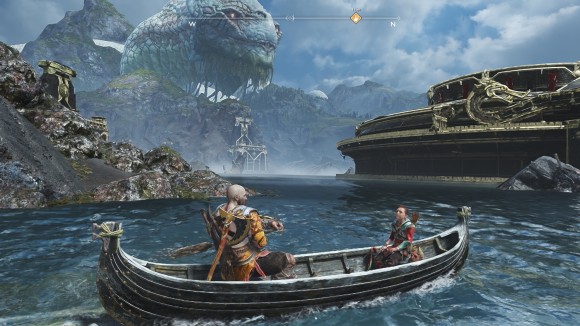
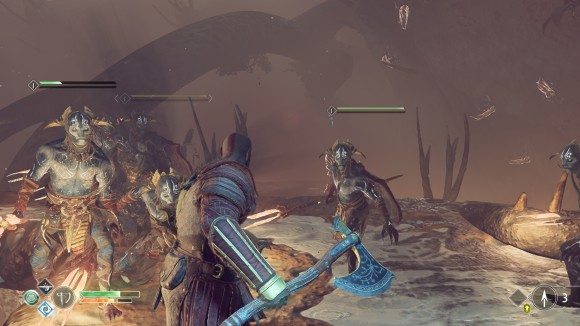
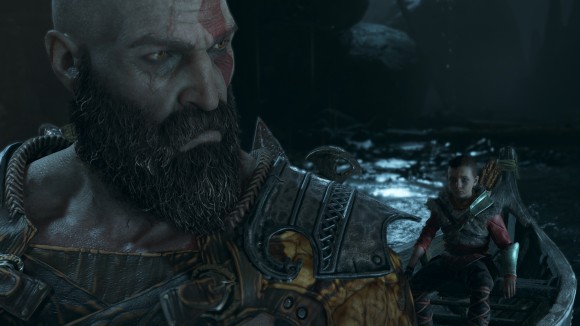
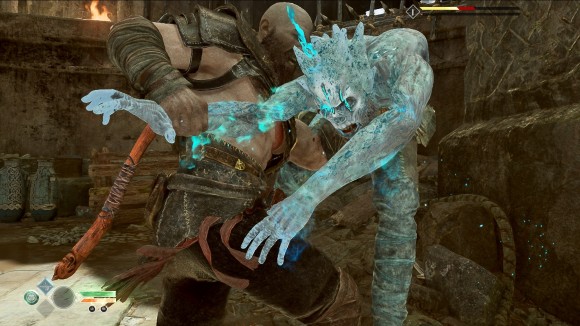
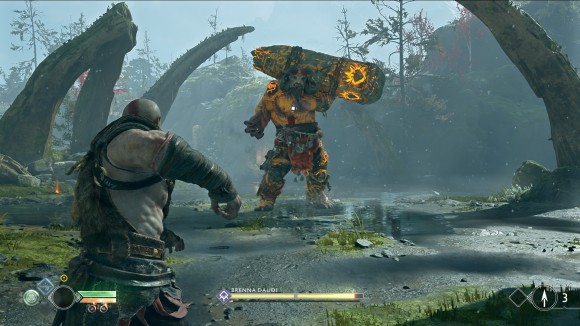
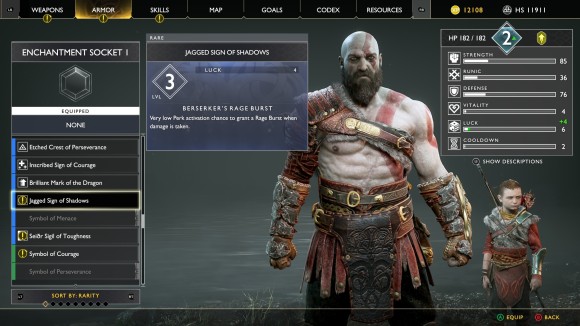
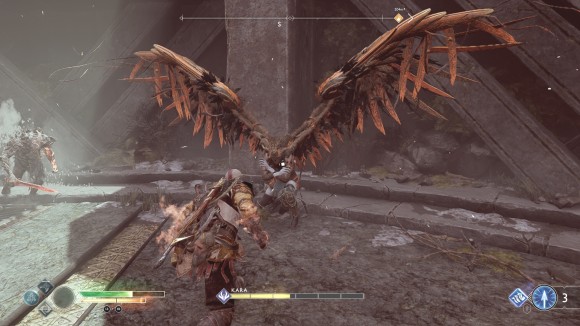
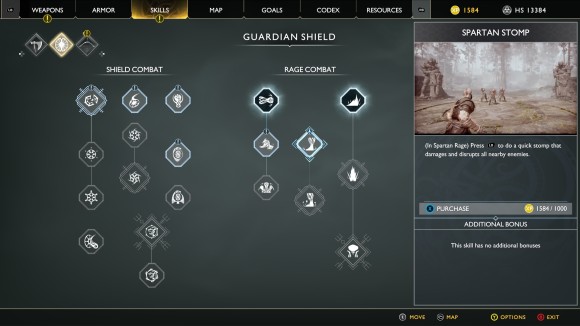
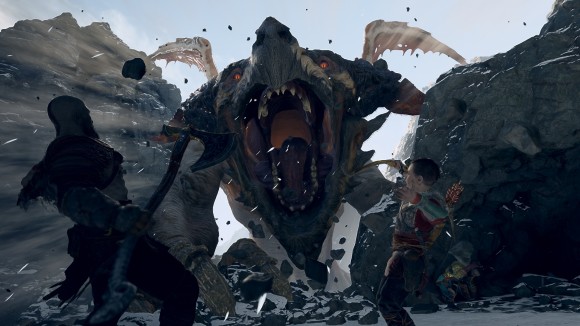
Wow, thanks for this reading. I like this style of writing (“But, but but but.” hehe) as well as the level of detail. Would like more of that.
Enjoy your stay!
In regards to the soft reboot aspect, my main criticism of this new God of War is how much it softens Kratos’ crimes. The things he did in the first six games (two on PS2, two on PSP, and two on PS3) are really fucking evil. In particular, this game makes Kratos worried about Atreus perpetuating the cycle of fratricide, when as a long-time God of War fan I feel like the actual threat is Kratos continuing his unbroken streak of familicide. Excluding the Greek pantheon and all the innocents he killed (like the *entire city of Atlantis*), Kratos killed his mother, brother, wife, and daughter. He’s a piece of shit! There’s something that sticks in my craw about the game wanting us to focus exclusively on “Kratos killed his dad” when that’s so far down the list of awful things he did and not terribly relevant to his dynamic with Atreus.